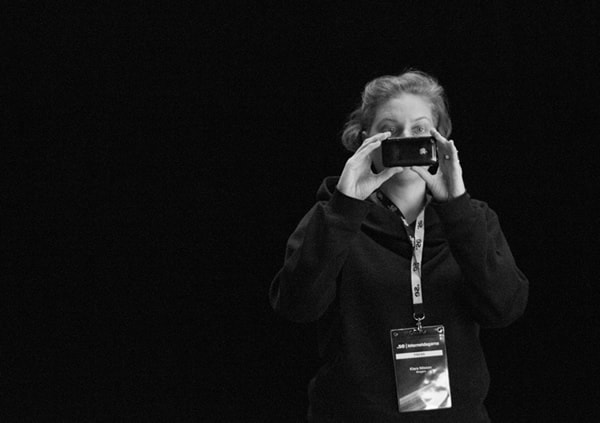The Rise Of The Weekend Warrior
It seems that everywhere you look these days, someone’s snapping away with a camera or a phone. A wedding photographer friend of mine even joked that when he’s shooting the bride and groom, he’ll frequently have ten people holding their iPhones over his shoulder in order to get the same angle.
There are a million and one “apps” available to put create effects on your phone photos and nearly as many cheap imaging programmes to do the same with your camera photos. Photography has never been so accessible.

image by Kalexanderson
In many ways, this isn’t a bad thing. I teach photography to adults and the sheer joy that many of them get from learning about something as simple as depth of field is a lovely thing to see. I really enjoy seeing people explore their creative side and realizing that they too can produce gorgeous imagery. I’ve even seen some fairly spectacular creativity expressed via a camera phone. All this is good and gives people an easy way to take snaps.
The Rise Of Accessible Photography
Unfortunately, the rise of accessible photography hasn’t been particularly kind to us pro photographers. The apparent simplicity of digital photography has convinced many people that they don’t need to hire a professional photographer, as they can do it themselves. The rise of the “my Uncle John’s got a decent camera and will do it for free” syndrome is a worrying development for most of us in the industry, particularly at a time when we’re already fighting against a recession and clients’ desires to get everything done more cheaply. From social to corporate work, we’re all feeling the pinch.
It’s one thing to cut rates slightly in a recession, but the problem is that we’re now often competing against people I call ‘weekend warriors‘. These are the people who have got really into their photography and have decided that they’ll start doing the odd shoot for a little money at the weekend.
Again, nothing intrinsically wrong with this. The trouble is though that these people usually have other jobs and don’t need the income from photography. So they start offering to do the work for very low sums. I’ve lost track of the number of phone calls I’ve had where, after quoting my prices for a job, I’ve heard the response, “Well, I’ve been quoted £50 (about $30) by another photographer”. My standard response nowadays is to tell them that if they want to pay peanuts, they’ll get a monkey, but the fact remains that it’s a frustrating situation.
How can one explain politely to a client that if someone is offering to do a job for very little money, they’re unlikely to be particularly well trained. Of course, it’s fair to presume that they will have a fair amount of natural ability (you wouldn’t offer to shoot a photographic job if you didn’t feel you had some ability!).
But it is unlikely that they will have much or any experience or necessarily the right tools for the job. Whilst a good photographer can produce a great shot with pretty much any camera, we still need the right lighting for different situations. Working with studio lighting is a skill that takes practice and isn’t something that can easily be replicated. And it certainly can’t be replicated with a pop-up flash on a DSLR!
Fortunately, a lot of my clients have come back to me somewhat sheepishly after trying to do shoots themselves. Apparently their pictures didn’t ‘look the same‘. Sadly, not everyone realizes the difference that using a professional can make. Yes, it’s understandable that in times of recession, people won’t want to pay out for fripperies. But it’s unfair to expect a skilled photographer to work for peanuts.
Sadly, a lot of clients don’t fully understand what they’re paying for. It’s not just the ability to produce lovely images and technical know-how. A client is paying for the continuing study of photography that we all engage in, equipment costs, insurance, transport, retouching… the list goes on. The point is that a professional photographer can’t just rock up to a gig with an entry-level DSLR or camera phone!
The rise of the weekend warrior isn’t something I necessarily have a solution to. Sometimes, by teaching amateurs, I’m aware that I am following the ‘if you can’t beat them, join them‘ philosophy. But I don’t think that not teaching people will make any difference. Anyone can read up on camera knowledge on the internet (often through articles I myself have written!). Like most of us, I rely on the fact that I have enough clients who realize the value of professional work. Fortunately I don’t believe that these enlightened souls will ever die out. Just as I still believe that the chance for amateurs to indulge their creativity is a good thing… as long as they keep out of my arena ;)
